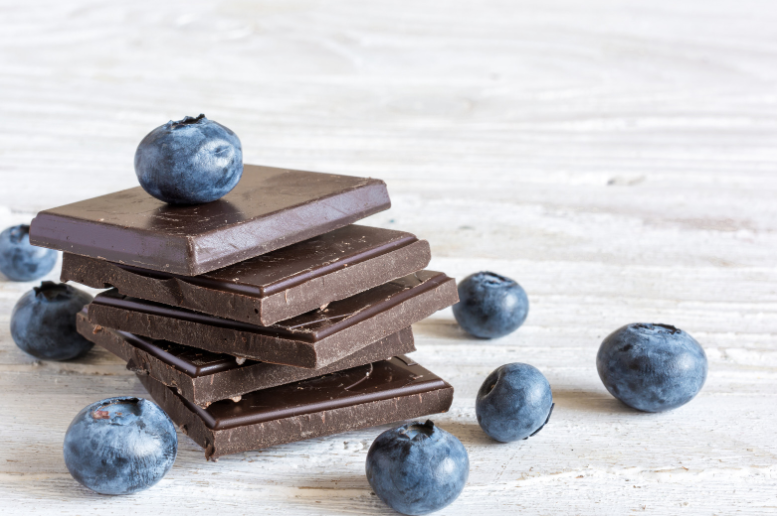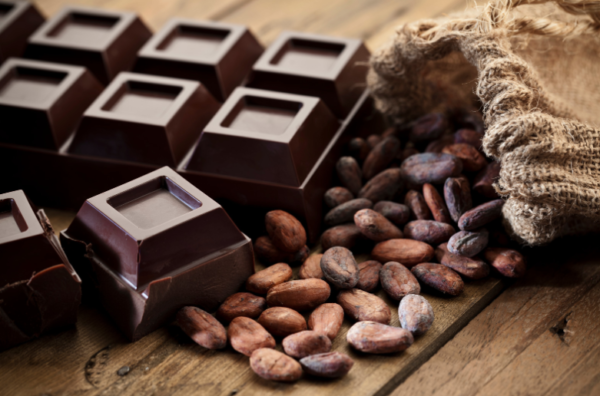Dark chocolate has grown in popularity in recent years as more and more research reveals the health benefits of dark chocolate.
Made from cacao beans that are fermented, roasted, and processed with minimal added sugars, dark chocolate is packed with antioxidants and nutrients that can positively impact your health when enjoyed in moderation.
Here is an overview of the top scientifically-proven benefits of dark chocolate.
Promotes Heart Health
One of the most researched benefits of dark chocolate is its impact on heart health.
The flavonoids in dark chocolate have been shown to lower blood pressure and cholesterol levels, reduce inflammation, and improve blood flow.
These effects are linked to a reduced risk of heart disease.
A 15-year study published in the British Medical Journal followed over 20,000 participants and found that those who consumed the most chocolate were 39% less likely to be diagnosed with cardiovascular disease.
Another study showed daily consumption of dark chocolate with 70% cocoa content for 2 weeks significantly decreased blood pressure levels.
The flavanols in dark chocolate stimulate the production of nitric oxide, which signals blood vessels to relax and expand.
Boost Brain Function
The cognitive benefits of dark chocolate keep emerging in scientific literature.
Dark chocolate contains caffeine and theobromine, two stimulant compounds that provide a slight energy boost.
More importantly, the flavanols in dark chocolate increase blood flow to the brain, which improves oxygenation.
This may explain why some studies have found short-term improvements in brain plasticity and processing speed after consuming dark chocolate.
The stimulation of neurotransmitters like serotonin and dopamine may also be involved.
A Harvard study found that drinking two cups of hot cocoa daily improved working memory in older adults.
More research is still needed, but the preliminary cognitive benefits of dark chocolate are promising.
Anti-Inflammatory Effects
Dark chocolate’s high concentration of antioxidants makes it effective at fighting inflammation.
Inflammation is at the root of many chronic conditions like cancer, diabetes, arthritis, and cognitive decline.
The polyphenols and flavanols in dark chocolate exhibit potent antioxidant and anti-inflammatory properties.
Studies have confirmed dark chocolate’s ability to lower inflammatory markers like C-reactive protein (CRP). A two-week trial had participants consume 20 grams of high-flavanol dark chocolate per day.
By the end, they exhibited significantly decreased CRP levels compared to the placebo group. The anti-inflammatory effects provide additional cardiovascular and brain health benefits.
Protect Skin Health

Early research indicates dark chocolate may boost skin health too.
Its antioxidants fight damage from UV radiation and improve skin hydration, thickness, and elasticity.
In a study published in the Journal of Nutrition, women who consumed a high-flavanol cocoa powder drink for 12 weeks experienced less skin roughness and scaliness versus the control group.
The researchers attributed the results to the protective effects of cocoa flavanols against sun damage.
Further research has confirmed that the flavanols in dark chocolate shield the skin from oxidative stress when exposed to UV rays.
This helps prevent signs of aging and damage like wrinkles and uneven pigmentation. Certain compounds in dark chocolate have also been shown to protect against risks from too much sun exposure like skin cancer.
Rich in Fiber, Iron, and Magnesium
In addition to its highly-touted antioxidants and anti-inflammatory compounds, dark chocolate provides dietary fiber and essential minerals.
A 100-gram bar of dark chocolate with 70-85 percent cocoa contains 11 grams of fiber.
The fiber content combined with dark chocolate’s low glycemic impact makes it a diabetes-friendly food.
Fiber also promotes satiety and aids digestion.
Dark chocolate is an excellent source of iron – a 1.5-ounce serving provides about 20 percent of the recommended daily amount.
Iron is integral for blood health and prevents anemia caused by deficiency.
Dark chocolate also provides substantial amounts of magnesium, which supports muscle, nerve, and heart functions.
A healthy dose of stimulating caffeine and theobromine adds to the nutritional profile of dark chocolate.
Improve Mood and Alleviate Depression
A particularly intriguing benefit of dark chocolate is its potential mood-boosting effects.
Research indicates the compounds in dark chocolate may positively impact mood, alleviate depression, and reduce anxiety.
This is attributed to cocoa’s influence on neurotransmitter levels and the release of feel-good endorphins.
One study found participants who consumed dark chocolate with a cacao content above 70 percent experienced reduced levels of self-reported depression and sadness.
The flavonoid content in cacao is thought to have similar effects on the brain as antidepressant medications.
More research is needed, but dark chocolate holds promise as a mood-enhancing superfood.
Tips for Buying and Eating Dark Chocolate

To reap the health perks of dark chocolate, be picky about what products you buy.
Not all dark chocolate is created equal – the cocoa content and ingredients can vary significantly between brands. Here are tips for selecting high-quality dark chocolate:
- Choose chocolate with a cacao content of 70 percent or higher. This guarantees more flavonoids and antioxidants.
- Check the ingredient list. Opt for bars with cocoa, cocoa butter, and minimal added sugar. Avoid dark chocolate with lots of unnecessary additives.
- Go for bars made from organic, ethically-sourced cocoa beans when possible. These have higher antioxidant levels.
- Pay attention to the cacao bean origin. Different regions yield cocoa with unique flavonoid profiles.
- Avoid Dutch processed/alkalized dark chocolate. This method reduces flavonoid content.
When incorporating dark chocolate into your diet, remember that moderation is vital. While very healthy, chocolate is high in calories and easy to overeat.
Stick to a 1-2 ounce serving size and avoid excessive daily snacking.
Focus on savoring complex flavors rather than mindless indulgence. Pair dark chocolate with fruits like strawberries or almonds for extra benefits.
The Bottom Line
High-quality dark chocolate made from cocoa with minimum processing delivers real health benefits thanks to its abundant antioxidants and nutrients.
Regularly eating modest amounts of dark chocolate may lower your risk for cardiovascular disease, improve brain function, reduce inflammation, boost your mood, and more.
When shopping, read labels and choose a bar with at least 70 percent cocoa for maximum nutritional value.
Dark chocolate makes for a delicious daily treat when consumed responsibly. Indulge in moderation and discover how pure, minimally-processed dark chocolate can enhance your well-being.
People also ask:
Is dark chocolate suitable for people with diabetes?
While dark chocolate has a lower glycemic index than milk chocolate, individuals with diabetes should still consume it in moderation and consider their overall carbohydrate intake.
Can dark chocolate cause caffeine-related issues?
Dark chocolate does contain caffeine, but the amount is relatively low compared to coffee or tea. However, those sensitive to caffeine should be cautious with their consumption.
Can dark chocolate help with stress relief?
Dark chocolate can help reduce stress and anxiety due to its serotonin-boosting properties, promoting relaxation and well-being.
How much dark chocolate should I eat per day?
The recommended daily consumption varies, but approximately 1-2 ounces (28-56 grams) of dark chocolate with at least 70% cocoa content is considered a reasonable amount.
Is white chocolate as beneficial as dark chocolate?
White chocolate lacks cocoa solids and is mainly made from cocoa butter, sugar, and milk solids. It doesn't offer the same health benefits as dark chocolate.

